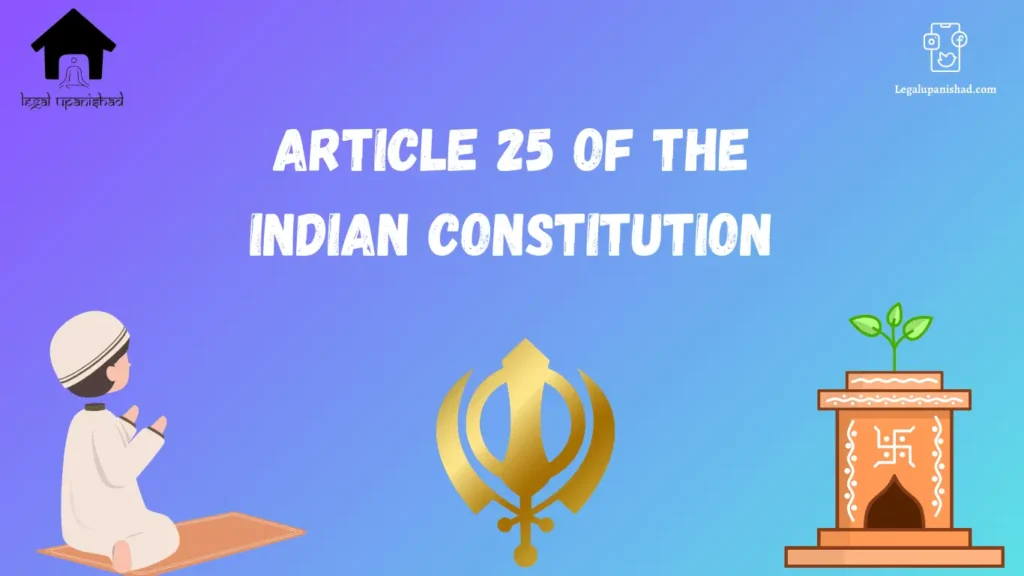This article on ‘Article 25 of the Indian Constitution: All You Need to Know’ was written by Toya Sen, an intern at Legal Upanishad.
Introduction
India, as a country, is truly unique and diverse. With its vast array of languages, religions, and traditions, India is considered a melting pot of diversity. The nation’s rich history and deep-rooted heritage are something to be proud of. India is the host and birthplace of many religions. For centuries, people belonging to different religious communities have lived together in harmony.
The makers of our constitution, keeping this diversity in mind, recognised the fact that religion is one of the essential aspects of a person’s life and plays a very important role. Hence, they chose a path for the newly formed country to be secular in nature, with no state religion, where everyone has the right to practice and would be free to profess any faith they belong to.
With an inclusive vision, Article 25 of the Indian Constitution embodies the essence of India’s pluralistic and diverse society, promoting secularism and providing citizens with the freedom to follow, profess, and propagate any religion of their choice. This article explores the significance, provisions, and implications of Article 25 in upholding religious freedom in India.
Article 25 of the Indian Constitution
Article 25: Freedom of conscience and free profession, practice, and propagation of religion.
“Subject to public order, morality, and health, and to the other provisions of this Part, all persons are equally entitled to freedom of conscience and the right to freely profess, practice, and propagate religion”
Significance of Article 25:
The significance of this article lies in its recognition of religious freedom as an essential right that every individual in India possesses. This article not only recognises the diversity of faiths and beliefs but also seeks to foster an atmosphere of tolerance and mutual respect among its citizens. This article upholds secularism, which is one of the essential features of our constitution, as mentioned in the preamble.
Rights under Article 25:
- Right to Freedom of Conscience:
The first aspect of Article 25 ensures that all individuals have the freedom of conscience; in other words, it means that all people have the right to follow and hold any religious or non-religious belief as per their choice alone. This right guarantees that no person can be forced into adopting a particular religion without their consent. This aspect of the right is essential for the protection of the autonomy and dignity of individuals. It also plays a vital role in the promotion of a liberal society and citizenry.
- Right to Freely Profess:
Article 25’s second aspect guarantees individuals the freedom to openly practice their religion. This includes public expressions of faith as well as private beliefs. It encompasses religious practices, rituals, ceremonies, and customs that are central to a person’s faith. This provision ensures that individuals can freely express their religious identity without the risk of persecution or discrimination.
- Right to Freely Practice:
The third aspect of Article 25 guarantees the right to freely practice one’s religion. This means that individuals have the freedom to observe and perform religious rituals, ceremonies, and rites as prescribed by their faith. It protects the right to participate in religious festivals, visit places of worship, and engage in religious practices without any hindrance. However, it is important to note that this right is subject to reasonable restrictions in the interest of public order, morality, and health.
- Right to Propagate Religion:
The fourth aspect of Article 25 bestows on individuals the right to propagate their religion. The right to propagate religion refers to the freedom to share one’s religious beliefs and ideas with others and attempt to convert them to one’s faith. This provision is sometimes a subject of debate and controversy, as it raises questions about the limits of religious conversions and the potential for exploitation or forceful conversion.
The Indian courts have clarified that this right is not absolute and cannot be exercised in a manner that offends public order, morality, or the freedom of others to practice their own religion.


Relevant Case Laws
- Bijoe Emmanuel v. State of Kerala
This case is also famously known as the National Anthem case. In this instance, three children who are part of the Jehovah’s Witness group declined to sing India’s national anthem, “Jana Gana Mana,” stating that it goes against their religious convictions. Despite this, the children stood up and remained silent as the anthem played every day in school, demonstrating respect and not showing any disrespect.
A commission was set up to investigate the matter, and in its report, it held that the children were abiding by the law and did not show any disrespect, even though they refused to sing the anthem. After receiving instructions from the Deputy Inspector of Schools, the headmistress made the decision to expel the students. This controversial decision was brought before the highest court in India, where it was deemed that the headmistress’s actions violated the children’s constitutional rights to freedom of religion.
Specifically, the court cited Article 19(1) and Article 25(1) as guarantees of this fundamental right. Moreover, the Supreme Court clarified that the act of singing the national anthem was not mandatory under any law, and standing silently during its playing did not constitute a sign of disrespect. This ruling serves as an important reminder of the need to respect individuals’ religious beliefs and constitutional rights.
- Shirur Mutt Case (1954):
This was the first case to infer Article 25 of the Indian Constitution. The court concluded that the term ‘religion’ encompasses all beliefs and practices that are fundamental to a given faith. The court also ruled that religious practices might be regulated by the state if they were detrimental to public order, morality, or health.
- Ramji Lal Modi v. State of UPBI.
In this case, the state government has tried to restrict the distribution of religious pamphlets in its territory, stating that such an act is considered unconstitutional. The Supreme Court of India, in its verdict, held that the right to freedom and religion under Article 25 includes the individual’s right to propagate one’s religion. The Court declared that the state does not have the power to restrict or interfere with a person’s right to profess their religion as long as this practice is done peacefully and does not threaten the public order of the state.
Conclusion
The Indian Constitution’s Article 25 is a crucial aspect that supports the fundamental right to practice and express one’s religious beliefs freely, without any fear or force. This article reflects India’s inclusive and diverse values and demonstrates the country’s devotion to secularism and communal harmony. While controversies and difficulties may arise regarding this constitutional provision, the Indian judiciary’s dedication to preserving the essence of Article 25 will play a significant role in balancing religious freedom with the greater public interest.
References
- The Constitution of India, Art. 19
- The Constitution of India, Art. 25
- Bijoe Emmanuel v. State of Kerala, 1986 SCR (3) 518
- The Commissioner Hindu Religious Endowment Madras v. Shri Laxmidhar Tirtha Swamiyar of Shirur Mutt, 1954 SCR 1005
- Ramji Lal Modi v. State of UPBI, 1957 SCR 860
- ‘Article 25 of the Indian Constitution’, Indian Kanoon, available at: https://indiankanoon.org/doc/631708/
- ‘Freedom of Religion’, Dirshti IAS, 2 May 2023, available at: https://www.drishtiias.com/daily-updates/daily-news-analysis/freedom-of-religion-5

